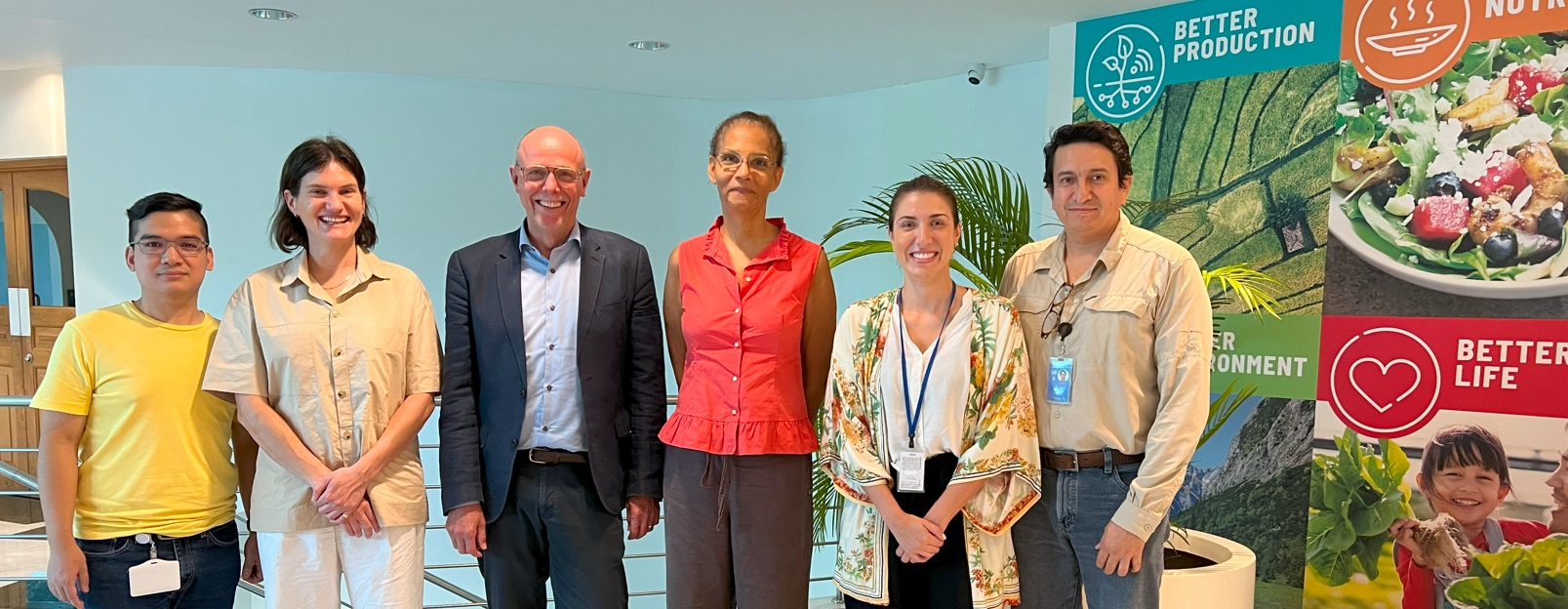FAO and UNICEF collaborate to enhance climate resilience in the Caribbean through social protection measures

From left to right: Roberto Sandoval, Disaster Risk Management Specialist (FAO), Gala Dahlet, Social Protection Officer (FAO), Pieter Bult, UNICEF Representative to the Eastern Caribbean, Renata Clarke, FAO Sub-regional Coordinator for the Caribbean, Flavia Lorenzon, Social Policy Specialist (UNICEF), Roberto Telleria Juarez, Policy Officer (FAO).
©FAO
The Food and Agriculture Organization of the United Nations (FAO) and the United Nations Children's Fund (UNICEF) push Caribbean nations to bolster climate action by integrating social protection plans into their updated Nationally Determined Contributions (NDCs) aiming to strengthen regional resilience.
As vital components of the Paris Agreement, NDCs define countries’ commitments to reducing greenhouse gas emissions and adapting to climate change. The 2025 revision phase provides a pivotal opportunity to enhance the role of social protection plans. Enhanced NDCs not only guide climate finance but also serves as critical framework for coordinated and multisectoral climate policies.
A global FAO report reveals that in the Caribbean, Dominica stands alone in recognizing social protection as a core strategy to meet adaptation goals, with a focus on bolstering livelihoods in fishing communities.
The Caribbean, one of the world’s most hazard-prone regions, faces escalating extreme weather challenges driven by climate change. These challenges severely impact communities, livelihoods, infrastructure, and ecosystems, leading to irreversible loss and damage with significant economic consequences across sectors.
Despite progress in development and adaptation, structural vulnerabilities – such as poverty, socio-economic inequalities - continue to pose significant challenges. Social protection has emerged as a vital policy tool for building resilience and tackle these vulnerabilities effectively.
The impact of social protection on climate resilience
In recent years, interest has surged in aligning social protection with disaster risk reduction, climate change adaptation and mitigation policies. This alignment can play a pivotal role in mitigating risks and enhancing adaptive capacity in the agricultural sector.
Integrating social protection into climate strategies offers significant opportunities particularly through:
- Adaptation: Enhancing disaster risk management and building long-term resilience.
- Mitigation: Supporting vulnerable groups during transitions towards greener jobs and incentivizing ecosystem conservation and/or restoration.
The way forward
FAO and UNICEF are joining forces to help Caribbean policy makers and stakeholders advocate and implement essential programmatic links that ensure a just transition across the region. Following a joint regional workshop on Social Protection for Climate Action held in Barbados in May 2024, and a capacity building for Grenada’s climate focal points organized by UNICEF in August 2024, both organizations will conduct contextualized deep dives this November in Grenada and Barbados. These sessions will facilitate interministerial dialogues between social development and environment stakeholders aiming to promote the integration of social protection in the updated NDCs of both countries.
Integrating social protection with climate strategies offers the Caribbean a pathway to a more sustainable and resilient future. The upcoming round of NDCs presents a unique window for Caribbean nations to integrate social protection as a core component of climate action.
